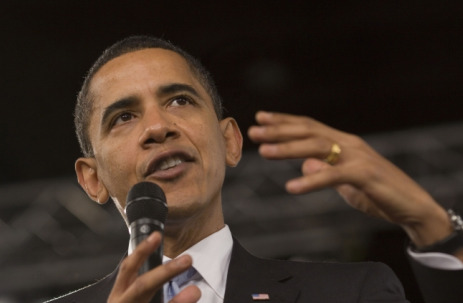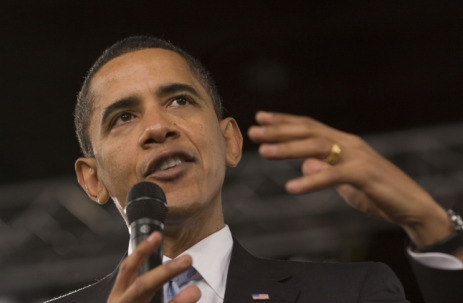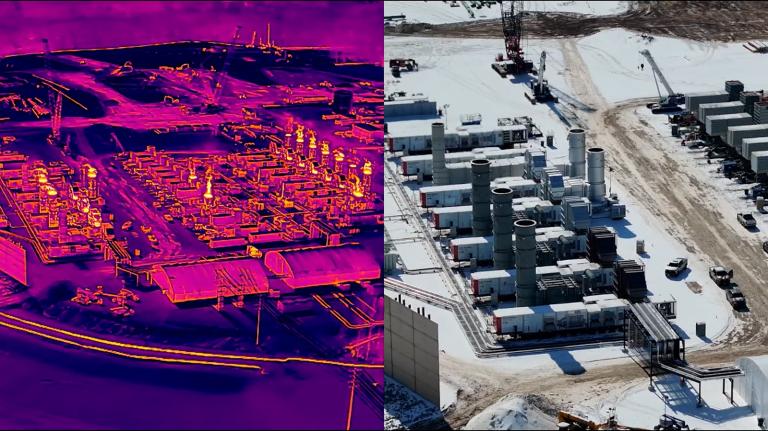 Tell it, Obama.Photo: Pete Souze / White HouseA must-read article in The Hill details a classic rift among Senate Democrats: On one side are Democrats who want to use public anger at oil companies to pressure Republicans to support the American Power Act; on the other are “centrists” who want to be nice to Republicans in hopes that they will join hands in bipartisanship. You know, ’cause of their devotion to the national interest.
Tell it, Obama.Photo: Pete Souze / White HouseA must-read article in The Hill details a classic rift among Senate Democrats: On one side are Democrats who want to use public anger at oil companies to pressure Republicans to support the American Power Act; on the other are “centrists” who want to be nice to Republicans in hopes that they will join hands in bipartisanship. You know, ’cause of their devotion to the national interest.
You might think the question of which strategy works better would have been settled by now. Repeatedly. Decisively. Republicans have voted against everything except those bills where they were under enormous pressure and at risk of embarrassment (see: financial reform). But of course “centrists” — along with some hopeless, thumb-sucking wanker from Third Way — once again think that this time, Republicans can be swayed by inspiring arguments about jobs and “American opportunity.” You have to wonder what it’s going to take for the reality of the modern Republican Party to sink in.
But anyway. The good news is that Obama seems to have sided with the Democrats.
As someone who’s been criticizing him for not taking a more active, muscular role in the climate-bill debate, I feel obliged to acknowledge that he delivered a hell of a speech today in Pittsburgh. Beyond the climate bits, it was just an extremely cogent, compelling statement on the differences between the parties and the contours of our historical moment. Let’s take a look at the energy part:
Now, this brings me to an issue that’s on everybody’s minds right now — namely, what kind of energy future can ensure our long-term prosperity. The catastrophe unfolding in the Gulf right now may prove to be a result of human error, or of corporations taking dangerous shortcuts to compromise safety, or a combination of both. And I’ve launched a National Commission so that the American people will have answers on exactly what happened. But we have to acknowledge that there are inherent risks to drilling four miles beneath the surface of the Earth, and these are risks — (applause) — these are risks that are bound to increase the harder oil extraction becomes. We also have to acknowledge that an America run solely on fossil fuels should not be the vision we have for our children and our grandchildren. (Applause.)
That last bit is going to frustrate some greens. An America “not run solely on fossil fuels” is the best we can shoot for? I wish he would aim a little higher. But we can’t forget just how far the average American is from understanding that clean energy is a serious, available alternative.
We consume more than 20 percent of the world’s oil, but have less than 2 percent of the world’s oil reserves. So without a major change in our energy policy, our dependence on oil means that we will continue to send billions of dollars of our hard-earned wealth to other countries every month — including countries in dangerous and unstable regions. In other words, our continued dependence on fossil fuels will jeopardize our national security. It will smother our planet. And it will continue to put our economy and our environment at risk.
He goes straight from the evils of oil to the evils of “fossil fuels.” Notice anything missing there? Rhymes with foal? Enemy of the human race? But such is political reality.
Another interesting aspect: At no point does he mention “climate change” or “global warming.” “Smother the planet” is as close as he gets. Obviously he’s listening to the messaging folks.
Now, I understand that we can’t end our dependence on fossil fuels overnight. That’s why I supported a careful plan of offshore oil production as one part of our overall energy strategy. But we can pursue such production only if it’s safe, and only if it’s used as a short-term solution while we transition to a clean energy economy.
None of us greenies like the offshore drilling concession one bit. But here he does seem to be shifting the framing a little, leaning on the fact that it’s only acceptable as a “short-term solution.” He’s drawing attention to the transition. See:
And the time has come to aggressively accelerate that transition. The time has come, once and for all, for this nation to fully embrace a clean energy future. (Applause.)
Nice, right? That’s unambiguous. And it’s not just about a bill; it’s about a full-scale national mission.
Now, that means continuing our unprecedented effort to make everything from our homes and businesses to our cars and trucks more energy-efficient.
He put efficiency first!
It means tapping into our natural gas reserves, and moving ahead with our plan to expand our nation’s fleet of nuclear power plants.
Well, what can you do.
It means rolling back billions of dollars of tax breaks to oil companies so we can prioritize investments in clean energy research and development.
Yes! I don’t understand why this hasn’t been on the tip of every Democrat’s tongue. What clean energy policy is going to be more popular right now?
But the only way the transition to clean energy will ultimately succeed is if the private sector is fully invested in this future — if capital comes off the sidelines and the ingenuity of our entrepreneurs is unleashed. And the only way to do that is by finally putting a price on carbon pollution.
So take your “energy-only” bill and shove it.
Now, many businesses have already embraced this idea because it provides a level of certainty about the future. And for those that face transition costs, we can help them adjust. But if we refuse to take into account the full costs of our fossil fuel addiction — if we don’t factor in the environmental costs and the national security costs and the true economic costs — we will have missed our best chance to seize a clean energy future.
This is about as close to a wonky explanation of the justification for a carbon price as you’re ever likely to get from a president. He almost said “externalities”!
The House of Representatives has already passed a comprehensive energy and climate bill, and there is currently a plan in the Senate — a plan that was developed with ideas from Democrats and Republicans — that would achieve the same goal. And, Pittsburgh, I want you to know, the votes may not be there right now, but I intend to find them in the coming months. (Applause.) I will continue to make the case for a clean energy future wherever and whenever I can. (Applause.) I will work with anyone to get this done — and we will get it done.
Yes. Until now, the rhetoric from the administration has all been about what the Senate will do — what they “hope” it will do, what they “expect” it will do. But now it’s not about them, it’s we, and it’s not about hope, it’s will. “We will get it done.” That’s the kind of thing that’s hard to climb down from. It’s what the beginnings of real commitment look like. No wonder John Kerry’s going apesh*t.
The next generation will not be held hostage to energy sources from the last century. We are not going to move backwards. We are going to move forward.
Boo-yah.
Now these are only words. One speech won’t do anything. He’ll have to keep hitting this theme again and again; he’ll have to make a major address to Congress; he’ll have to send Rahm Emanuel and Jim Messina to twist arms in the Senate. But it’s a beginning. He finally seems to be waking up to the historical opportunity that has, um, spilled into his lap.




